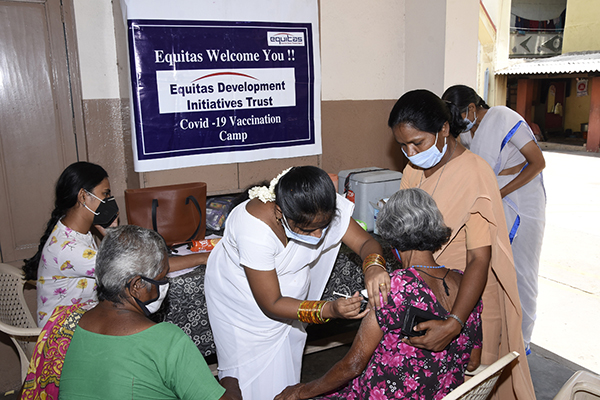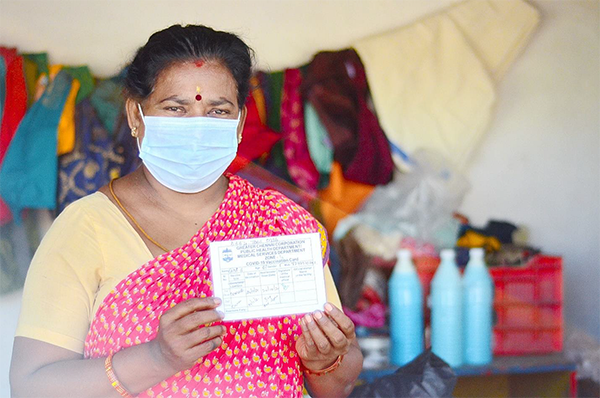 In May 2021, the Delta wave of cases and deaths caused widespread devastation in India. Some estimates projected a staggering peak of nearly 40,000 deaths per day. While front page news focused on the shortage of oxygen supply and hospital beds, the challenge of immunizing such a populous country was undeniable: less than 3% of India’s population had received a two-dose regimen of COVID-19 vaccines and misinformation around vaccinations was rampant.
In May 2021, the Delta wave of cases and deaths caused widespread devastation in India. Some estimates projected a staggering peak of nearly 40,000 deaths per day. While front page news focused on the shortage of oxygen supply and hospital beds, the challenge of immunizing such a populous country was undeniable: less than 3% of India’s population had received a two-dose regimen of COVID-19 vaccines and misinformation around vaccinations was rampant.
Opportunity International Australia (Opportunity) works alongside MFIs like Equitas Small Finance Bank (Equitas), socially focused financial service providers with enormous capacity for large-scale and rapid community mobilisation. There’s a tremendous opportunity to leverage the core assets and competencies of MFIs – grassroots social mobilisation, last mile distribution network and existing trusted relationships in communities – to support the critical nation-wide immunization efforts on the road to post-COVID-19 recovery in India and other emerging markets.
Opportunity, Equitas Development Initiatives Trust (the charitable trust created alongside the commercial Equitas entity) and local state government stakeholders together developed an innovative public-private partnership (PPP) model to address vaccine access in last-mile and vulnerable communities. The government provided doses of COVID-19 vaccines free of cost and health workers to administer the doses. Equitas leveraged its network of Corporate Social Responsibility (CSR) officers, branch staff and networks of microfinance clients to mobilize communities to attend these pop-up camps, while Opportunity provided the philanthropic funding needed to supply signage and communications materials, water and face masks, and transport for health workers. Equitas is the first MFI to engage in an immunization campaign in collaboration with the government on a nationwide scale, conducting more than 41,000 vaccination camps and expected to reach over 5 million people by early July.
An average vaccination camp reaches about 110 people, where most beneficiaries can travel by foot, which has been a key success factor in the reach of the program. A case example is Selvi, 52 years old, who owns a small tailoring shop in a rural area and lives with her 2 children. Selvi was frightened by the misinformation from various sources and had no idea how or where to get vaccinated until she was approached by an Equitas CSR officer who helped to address her worries about the vaccine and bring her to the vaccination camp.
 Selvi was able to resume her work and stitching immediately after receiving her vaccination, attending to customers comfortably and travel locally with more confidence. Selvi shows her vaccination certificate to everyone passing her shop to encourage others to get vaccinated.
Selvi was able to resume her work and stitching immediately after receiving her vaccination, attending to customers comfortably and travel locally with more confidence. Selvi shows her vaccination certificate to everyone passing her shop to encourage others to get vaccinated.
Like Selvi, over 55% of participants surveyed were motivated to get vaccinated because of encouragement by Equitas field staff, and they highlighted the proximity of Equitas camps, when compared to Government hospitals, as the main reason for choosing Equitas, enabling faster access to vaccines. Impressively, 100% of participants surveyed were ‘satisfied’ or ‘very satisfied’ with the experience at the Equitas vaccination camp.
While some MFIs have attempted standalone health interventions, like basic health education, most lack the technical expertise, confidence, and catalytic capital to deliver transformative health programs. However, the experience of the COVID-19 pandemic has proved the importance and value of effective partnership in community-based promotion, and Equitas has demonstrated that it’s not only possible, but also highly effective, for MFIs to leverage the existing trusted networks of branches, clients, and field staff to deliver last mile primary care.
As of 15 May 2022, 63% of the population in India has received two doses of COVID-19 vaccines, and 2% of the population has received a third booster dose. While there’s a long path ahead, Equitas and Opportunity continue to run vaccination camps to close the gap of vaccine access. We hope that this example helps to support key steps in establishing partnerships between a private MFI, local public health authorities as well as non-governmental and/or philanthropy partners.
The full results of the third-party evaluation of this work were presented at the 7th European Research Conference on Microfinance held on 20-22 June 2022 at the Yunus Centre for Social Business and Health at Glasgow Caledonian University.
To learn more about Opportunity International Australia’s programs or donate to help more families in poverty through financial inclusion, please visit www.opportunity.org.au
Photo credits: Equitas



Leave a comment